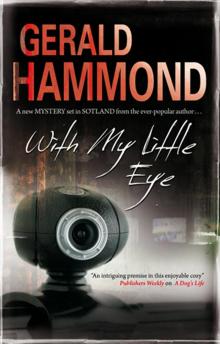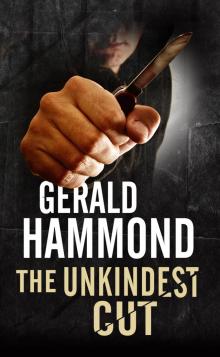- Home
- Gerald Hammond
Snatch Crop Page 2
Snatch Crop Read online
Page 2
The two men nodded and moved apart.
I changed out of my wedding dress and we ran the gauntlet and escaped as soon as we decently could. The whole affair was one of those occasions, like a visit to the dentist, which are hell at the time but when they’re over you’re glad you did it.
We flew to Cyprus, taking our shotguns with us. There was a major clay pigeon tournament on and we both entered; but our minds were on other things and our reflexes were slow. I think that my reaction time had gone out to about ten seconds. It was the first time in years that I hadn’t even taken the ladies’ bronze, but I didn’t care. And that is all that I intend to say about our honeymoon.
*
We came back to Ian’s small flat in Newton Lauder instead of to the dated Victorian charm of Briesland House two miles outside the town. I was now Mrs Fellowes instead of Miss Calder. And Ian and I could now share a bed.
Everything was different and yet life was much the same. We were hardly back when Dad gave me, as an extra wedding present, Sam, the semi-retired Labrador who had been my companion all through my teens. Sam had been more my dog than Dad’s anyway, as I pointed out to him. ‘But what,’ I asked, ‘am I supposed to do with Sam while I’m away slaving over the hot stove that you and Sir Peter have lumbered me with?’
‘We can keep him for you at the shop,’ Dad said. ‘You’ll be passing the door, morning and evening.’ Which was all very well for Dad, who avoided serving in the shop as much as he could. Wallace might not be pleased to have a pair of hungry eyes following him around.
I took Sam along for a day at the grouse at Sir Peter’s invitation, although Sir Peter himself was busy elsewhere. Ian and Sam and I had a big day decoying pigeons and when September came in we wasted a couple of very early mornings in going to the foreshore in search of the first duck of the season.
Ian had raised no objection to my being a working wife and, after my initial resistance had waned, I began to work up enthusiasm for the project. Sir Peter, it seemed, was very busy with some ploy of his own and little had been done except to sign the lease for the two small units. But, to my dismay, he had taken one step that I would rather he had left to me. He had engaged a secretary. This was Mrs Thrower. She needed the job now that her husband was no longer bringing home an income, she explained – as though working was somehow more of a disgrace than being deserted for a younger woman – and the sale of the family home had brought in little more than enough to pay off the mortgage. She seemed competent enough, but she was eternally sorry for herself and although she seemed reluctant to take the smallest decision on my behalf she let me see that in her view I was far too young to be her boss.
It was left to me to prepare for business and I began to work flat out. The machinery had to be overhauled, small equipment and materials purchased. Mum was a heaven-sent source of sound advice.
If I waited too long, the redundant workers would all have found jobs elsewhere, yet I was not going to take them on and pay them to stand idle. In desperation, I went out at night with Uncle Ronnie, lamping for rabbits with a .22 rifle from his Land Rover and for three nights in a row we filled the back of his vehicle. The local pigeon-shooters were doing good business over the rape and barley stubbles and game dealers’ prices had fallen through the floor. I bought the lot and some frozen pheasants left over from the previous January. A neighbouring business printed up freezer-bags for me.
My newly hired staff were kept hard at it, skinning and plucking, cleaning, cooking, bagging-up and freezing. For a day or two I was near panic, wondering whether I hadn’t overreached myself. Money was dribbling away and I might be on the brink of a financial disaster. But I spent some time flirting with a reporter on the local rag and he gave us several column inches on the subject of free-range, organic meat. Then I struck a deal with a supermarket manager. In exchange for a cut-throat bulk price for bacon and Irish mushrooms, I presented him with our first gross and a half of bagged and frozen pie-fillers. He made them his loss-leader for a few days and they caught on. The fish-vans, as Sir Peter had predicted, were desperate for other lines and they began to push our wares.
But it was for the pheasants and other game-birds that the business had been set up. It had been a dry summer and by late October good pheasants were coming on the market and the price was already slumping. We were paying slightly above the going rate. Other shoots beside the original members were bringing us their birds. The game dealer, who was doing well with venison, was, if anything, rather relieved. Three more estates applied for membership. More outlets had opened up and, thanks in part to some inexpensive advertising, the oven-ready birds moved well. I began to have some time to spare for housewifely duties and Ian seemed pleased to escape from a diet of game pies.
If business was developing well, I was saved from complacency by a series of minor irritations. Mrs Thrower’s air of superiority was a constant annoyance. Her frequent grumbles about the accountant husband who had deserted her depressed me. He had, it seemed, vanished completely and might have been dead except for the occasional money order – totally inadequate, according to Mrs Thrower – which arrived through the post at irregular intervals. When I tried to imagine how I would feel if Ian treated me the same way I was inclined to be sympathetic, but that only encouraged more bouts of self-pity and made me feel that in Mr Thrower’s shoes I would have taken similar evasive action.
Because the school was only a street or two away, Delia came straight to us for the last couple of hours of the working day. Any objection on my part only provoked a monologue from Mrs Thrower on the subject of the dangers awaiting a young girl in the streets, although Newton Lauder was not noted for rapine and I thought that Delia’s preoccupation with boys who had barely attained puberty (and had no idea what to do with it) made her relatively proof against seduction. We tried to get her to earn some pocket-money by fetching and carrying or vacuuming up the downy feathers which permeated the place, but she preferred to make a nuisance of herself, pestering the girls for attention and interfering with the machinery. I was tempted to stuff her into the plucking machine or one of the boiling pans but nobly resisted the temptation.
One evening, when the play we were watching had finished, Ian used the remote control to kill the television. Sam, who had been snoozing on the hearth-rug, took it as a signal that his evening walk was due and began to struggle to his feet. ‘Apart from Mrs Thrower’s word for it,’ Ian said, ‘have you seen or heard anything to convince you that she doesn’t know where her husband is?’
Sam recognised the signs and lay down again.
I thought it over. The question seemed to be carefully worded to obscure the reasoning behind it. Ian was very meticulous about not betraying police secrets at home, which usually suited me. There are more interesting topics for pillow talk. But this was of direct concern to me. ‘What exactly do you want to know?’ I asked him.
‘Let’s just pretend that I’m a police officer and that you’re a member of the public who happens to be her employer. Well?’
‘Very well, officer,’ I said. ‘No, there haven’t been any visits or phone calls, and if there have been any letters they didn’t come to the factory and she hasn’t shown them to me.’
‘That’s what I thought,’ he said. He changed the subject quickly and a few minutes later he went out with Sam.
Next day, watching Mrs Thrower typing up invoices, the question and answer came back to me. It seemed that Ian suspected that the Throwers were still in touch, which suggested some sort of conspiracy. It was an hour later before a more obvious explanation struck me. Ian suspected that Mrs Thrower had murdered her husband. Perhaps they were even now digging up the garden of the house where they had once lived together.
The idea, incredible at first, soon took on a macabre credibility. Mrs Thrower was not a very clever woman but she had a strong and ruthless personality. That, coupled with her obvious bitterness, made her, in my mind, a potential murderess. Soon, I found that I was passing our f
ew conversations through a mental filter in search of any implication that I might be a danger to her.
This was getting to be a bit of a pain in something or other. When Mrs Thrower was next in a talkative state I tried to turn her grumbling into disgorging of information.
I decided on an oblique approach. ‘Were there no warning signs?’ I asked her. ‘Or did he just vanish?’
She gave what I can only describe as a bitter laugh. ‘There were all the usual signs,’ she said. ‘Saying that he was kept late at the office but not answering on his private line. Traces of perfume that I wouldn’t wear for a bet.’ She looked at me as if wondering whether I were too young for such confidences and then seemed to decide that, as a young married woman, I had probably found out about the horrors of sex by now. ‘That I didn’t mind as long as he was discreet about it – we had put that sort of thing behind us. If sex was so important to him, let him get on with it. I thought he’d get it out of his system. I certainly never expected him to pack a few bags while I was out of the house.’ The harsh lines around her mouth deepened. ‘Left me a note, if you please, to say that he’d gone off with somebody else and wouldn’t be coming back. And then he had the impertinence to ask me in a PS to give Delia his love.’
‘He’s probably fed up with the other woman by now. Have you asked him to come back?’
‘Writing through his solicitors? That’s the only address I have for him. I have more pride than that. Anyway, I wouldn’t have him back now. The damage is done.’ She sniffed, haughtily rather than tearfully, and went back to her typing.
She was so obviously suffering from hurt pride rather than a broken heart that I knew she had to be telling the truth. All in all, I decided, the Throwers were the millstones round my neck.
I was soon to be relieved of one of them.
*
In early November, Sir Peter arrived suddenly with Wallace James, Dad’s partner, and they spent the afternoon going over the figures. Wal began his working life as an accountant and Sir Peter often begged his help in interpreting figures. Wallace pronounced himself satisfied and left to relieve Dad at the shop. Sir Peter settled down in the office. He congratulated Mrs Thrower on her books and she half-bowed in her queenly way, which was a piece of impertinence – I had pulled her up more than once for sloppy book-keeping and had ended up doing most of the work myself.
He turned his attention to me. ‘As for you, my dear,’ he said, ‘you’ve done wonders already. If you go on like this, the subscribing shoots can expect a good dividend at the end of the season and there’ll be a bonus for yourself. For both of you, in fact.’
I made modest and grateful noises but Mrs Thrower just bowed again.
‘And now,’ Sir Peter said, ‘I’d like a word in private with Mrs Thrower on quite another matter. May we use this office?’
This was a polite way of inviting me to go for a walk. I could hardly refuse. Mrs Thrower seemed neither surprised nor apprehensive, so I left them to it and went out to supervise the cleaning-up and scrubbing-out that marked the end of the day. Whenever I caught sight of them through the glass of the office partition I thought that Mrs Thrower was being her usual querulous self but that Sir Peter looked more anxious than he usually allowed the world to see. He was looking old. That gave me a sudden feeling of unease. All my life, he had looked the same – a rather scarecrow figure with a bush of untidy grey hair, dressed in one or another of his shabby kilts. The revelation that he might after all be mortal kicked away one of my foundation-stones.
Just as the work was finishing, Ian turned up to take me home. I looked at him, to be sure that he had not also aged suddenly, but he was the same man, young for his new rank, square-faced, red-haired, snub-nosed and built to last for ever. I felt secure again.
When the staff had gone and we were ready to leave, Sir Peter and Mrs Thrower came out of the office. She looked around her. ‘Where’s Delia?’ she asked me.
‘I haven’t seen her,’ I said. ‘I thought you must have arranged to collect her from a friend’s house.’
We all looked pale under the fluorescent lights of the factory unit, but Mrs Thrower had lost what little colour had been left to her. ‘Definitely not,’ she said. ‘She was supposed to come straight here.’ She ran to the door and threw it open. ‘Delia!’
There was no answer. She turned uncertainly to face us. ‘Damn, damn, damn!’ she said.
‘Keep calm,’ Sir Peter said. ‘She’ll probably turn up at any moment. Probably been kept late at school.’
Mrs Thrower looked at her watch and shook her head.
I looked around for Ian. He had gone into the office. I saw him put down the phone. He came out. ‘There’s been no report of an accident,’ he said. ‘No incidents at all. The uniformed branch will keep an eye out for her. What do you want to do?’
‘You should wait here for a while,’ Sir Peter said to Mrs Thrower, ‘in case she shows up or telephones. You could phone the school and the homes of any of her friends. And your own house, of course, in case she’s misunderstood you and gone straight home. I’ll go and look around for her.’
‘That would be best,’ Ian said. ‘It’s too early to involve us – the police – officially. If there’s nothing I can do for the moment I’ll go and eat and then phone you at home.’
It seemed callous to walk away. ‘Would you like me to stay with you?’ I asked her.
She shook her head again. Her expression suggested that I was a contemporary of Delia and would probably be more trouble than I was worth.
‘We’ll go then,’ I said. From the door, I looked back. ‘Don’t worry. She’s probably in some friend’s house, watching television.’
‘I don’t allow her to watch television.’
‘Never?’
‘Never.’
My face must have shown my surprise and disapproval. Any form of unnecessary censorship strikes me as silly and probably counter-productive. It makes the subject more interesting and introduces the great difficulty of drawing lines between undefinable areas – or, like Mrs Thrower, leaping to the illogical extreme. Ignorance in a young girl is not protection. ‘There is nothing on it but sex,’ she added defensively. ‘Sex, sex, sex, sex, sex.’
‘Listen,’ I said to Ian. ‘She’s singing our song.’ I spoke softly but she probably heard me.
Chapter Two
Ian, as usual, drove the car through the dark streets. To celebrate his new rank and his new status as a married man he had taken advantage of a nought-per-cent finance offer and traded in his old banger for a brand-new hatchback. Neither of us could be sure that our marriage would have survived if I had put a scratch on its mint paintwork.
We collected Sam and installed him in the back. ‘Delia’s probably only playing her mother up,’ I said. ‘All the same, let’s zig and zag a bit, going home.’
We zigged and zagged, twice passing Sir Peter. There was no sign of Delia. We stopped to speak to the only group of children on streets which had been emptied by mealtime, but none of them had seen her since school.
‘We’d better go and eat,’ Ian said at last.
‘It’s not like you to come away when a child’s gone missing.’
‘If she’s still missing in an hour’s time, I’ll start the ball rolling,’ he said. ‘After that, I may not have time to eat.’
I let it go for the moment. ‘Sir Peter’s looking his age all of a sudden,’ I said.
Ian brought the car to rest, very gently, outside the flat. ‘I think he’ll pass his next MOT,’ he said lightly. ‘And the one after that.’
The night was wet. He held an umbrella over me as though I would dissolve between the car and the front door. I headed for the kitchenette and began to scramble a quick meal together and another for Sam. With both of us working, we only managed what Mum would have considered to be ‘proper’ meals at weekends. We usually took a mild drink, to mark the change from work to leisure, but although he brought me my usual weak gin and tonic I noticed that
he forewent his dram of whisky.
We sat down to a sort of mixed grill with microwaved vegetables, followed by fruit, biscuits and cheese and coffee. Even Mum could not have done better in the time.
‘Now,’ I said, ‘what are you holding back?’
‘How do you mean?’
‘Don’t be evasive,’ I said sternly. ‘If you start answering a question with a question I’ll start withholding your marital privileges. Young Delia’s gone missing. She may have been kidnapped or even murdered. If any other young girl in the town failed to show up after school, you’d be dashing around like a chicken with its head cut off. And not long ago, you suspected Mrs Thrower of having murdered her husband. For all I know, you still do. And yet you accept Delia’s disappearance without a quiver. So there’s something I don’t know.’
‘There’s a lot you don’t know,’ he said gently. ‘For a start, when did I ever say that we suspected her of disposing of her husband?’
‘When did you ever say a damn thing?’ I retorted.
‘Now who’s answering a question with a question?’ he said, doing it himself. ‘Let me assure you of one thing. It seemed possible that Mr Thrower had been done away with, and it still does seem on the cards. But if that turns out to be so, his widow will figure very low on the list of suspects.’
‘If you’d told me that, I needn’t have made myself dizzy turning round so as not to let her get behind me.’ Another thought came to me. ‘Sir Peter was having an earnest and private talk with Mrs T just before you arrived. He’s been too busy to come and poke his nose into the running of the business, and that isn’t like him. He brought Wallace James with him and Wallace doesn’t usually still do accountancy. Dad’s been too busy to shoot, so my guess is that Wal’s been neglecting the shop because Sir Peter’s working his backside off. So what’s going on? Don’t tell me that there isn’t a connection.’

 Home to Roost
Home to Roost A Dead Question
A Dead Question Twice Bitten
Twice Bitten The Curse of the Cockers
The Curse of the Cockers In Loving Memory
In Loving Memory Illegal Tender (Three Oaks Book 12)
Illegal Tender (Three Oaks Book 12) Cold Relations (Honey Laird Book 1)
Cold Relations (Honey Laird Book 1) A Brace of Skeet
A Brace of Skeet Silver City Scandal
Silver City Scandal Sauce For the Pigeon
Sauce For the Pigeon Cold Relations
Cold Relations Hook or Crook
Hook or Crook The Curse of the Cockers (Three Oaks Book 5)
The Curse of the Cockers (Three Oaks Book 5) Snatch Crop
Snatch Crop Sting in the Tail (Three Oaks Book 6)
Sting in the Tail (Three Oaks Book 6) A Dead Question (Honey Laird Book 2)
A Dead Question (Honey Laird Book 2) In Loving Memory (Honey Laird Book 3)
In Loving Memory (Honey Laird Book 3) Thin Air
Thin Air Sting in the Tail
Sting in the Tail Pursuit of Arms
Pursuit of Arms The Game
The Game Give a Dog a Name (Three Oaks Book 4)
Give a Dog a Name (Three Oaks Book 4) Fair Game
Fair Game The Executor (Keith Calder Book 10)
The Executor (Keith Calder Book 10) Whose Dog Are You? (Three Oaks Book 2)
Whose Dog Are You? (Three Oaks Book 2) Mad Dogs and Scotsmen (Three Oaks Book 7)
Mad Dogs and Scotsmen (Three Oaks Book 7) Cousin Once Removed
Cousin Once Removed The Worried Widow
The Worried Widow A Shocking Affair
A Shocking Affair Dead Weight (Three Oaks Book 11)
Dead Weight (Three Oaks Book 11) Whose Dog Are You
Whose Dog Are You The Revenge Game
The Revenge Game With My Little Eye
With My Little Eye Doghouse (Three Oaks Book 3)
Doghouse (Three Oaks Book 3) In Camera
In Camera Bloodlines (Three Oaks Book 8)
Bloodlines (Three Oaks Book 8) The Unkindest Cut
The Unkindest Cut